-
 bitcoin
bitcoin $87959.907984 USD
1.34% -
 ethereum
ethereum $2920.497338 USD
3.04% -
 tether
tether $0.999775 USD
0.00% -
 xrp
xrp $2.237324 USD
8.12% -
 bnb
bnb $860.243768 USD
0.90% -
 solana
solana $138.089498 USD
5.43% -
 usd-coin
usd-coin $0.999807 USD
0.01% -
 tron
tron $0.272801 USD
-1.53% -
 dogecoin
dogecoin $0.150904 USD
2.96% -
 cardano
cardano $0.421635 USD
1.97% -
 hyperliquid
hyperliquid $32.152445 USD
2.23% -
 bitcoin-cash
bitcoin-cash $533.301069 USD
-1.94% -
 chainlink
chainlink $12.953417 USD
2.68% -
 unus-sed-leo
unus-sed-leo $9.535951 USD
0.73% -
 zcash
zcash $521.483386 USD
-2.87%
How to buy USDT at a low price through block trading?
Block trading USDT involves buying large quantities in a single transaction, often at a discount, but requires substantial capital and careful negotiation with sellers like market makers or OTC brokers.
Mar 28, 2025 at 03:09 am
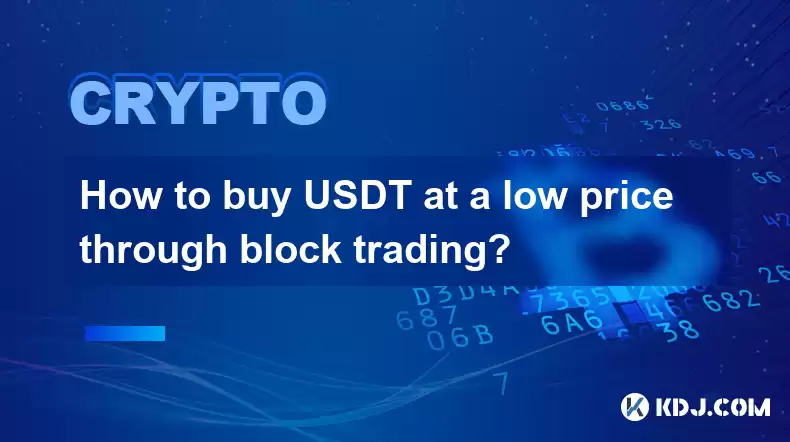
Understanding Block Trading and USDT
Block trading, in the context of cryptocurrencies, refers to the purchase or sale of a large quantity of a digital asset in a single transaction. This contrasts with smaller, individual trades executed on public order books. USDT, or Tether, is a stablecoin pegged to the US dollar, aiming for a 1:1 ratio. Buying USDT in bulk via block trades can potentially offer lower prices than buying smaller amounts on exchanges due to negotiated discounts and reduced transaction fees. However, it also involves a higher degree of risk and requires a larger capital investment.
Identifying Potential Sellers for Block Trades
Finding sellers for large USDT block trades requires networking within the cryptocurrency community. This often involves direct contact with:
- Market Makers: These are large institutional traders who provide liquidity to exchanges. They may be willing to negotiate block trades for substantial quantities of USDT.
- Over-the-Counter (OTC) Brokers: OTC brokers facilitate large, off-exchange trades, often providing better pricing for bulk purchases than public exchanges. They typically cater to high-net-worth individuals and institutional investors.
- Other Institutional Investors: Large cryptocurrency holders might be willing to sell a portion of their USDT holdings through a private block trade. Identifying these potential sellers often requires established connections within the crypto ecosystem.
Negotiating the Price and Terms
Negotiating a favorable price for a block trade requires a strategic approach. Key factors to consider include:
- Market Depth: Analyze the current market price of USDT across different exchanges to establish a baseline for negotiations.
- Trade Volume: The larger the volume you're looking to purchase, the greater the potential for a discounted price.
- Payment Method: Discuss payment methods upfront, ensuring both parties agree on a secure and efficient process. This might involve wire transfers or crypto-to-crypto transactions.
- Transaction Fees: Negotiate transaction fees with the seller. Block trades may have lower per-unit fees compared to exchange trades, but still require careful consideration.
- Settlement Time: Agree on a realistic settlement time frame for the transaction. This could range from a few hours to several days, depending on the size and complexity of the trade.
Executing the Block Trade Safely
Security is paramount when executing large cryptocurrency transactions. Here are some essential steps to ensure a safe block trade:
- Due Diligence: Thoroughly vet potential sellers to mitigate risks of scams or fraudulent activities.
- Escrow Services: Consider using a reputable escrow service to hold the funds until both parties fulfill their obligations. This protects both buyer and seller from potential disputes.
- Legal Counsel: For extremely large trades, seeking legal advice is advisable to ensure compliance with relevant regulations and protect your interests.
- Secure Wallet: Use a secure and reputable cryptocurrency wallet to store your purchased USDT. Hardware wallets offer the highest level of security.
- Verification: Verify the identity of the seller and ensure the legitimacy of the transaction before releasing funds.
Post-Trade Considerations
After successfully completing the block trade, it's crucial to:
- Record Keeping: Maintain meticulous records of the transaction, including timestamps, amounts, and communication logs.
- Tax Implications: Be aware of the tax implications associated with large cryptocurrency transactions in your jurisdiction. Consult a tax professional for guidance.
- Market Monitoring: Continue to monitor the USDT market to assess the performance of your investment.
Frequently Asked Questions
Q: What are the risks associated with block trading USDT?A: The primary risks include counterparty risk (the seller defaulting), market volatility impacting the value of USDT before settlement, and the potential for scams. Due diligence and the use of escrow services can mitigate these risks.
Q: Is block trading USDT suitable for all investors?A: No. Block trading requires substantial capital and a high degree of understanding of cryptocurrency markets and risk management. It's generally not suitable for novice investors.
Q: How can I find reputable OTC brokers for USDT block trades?A: Research and vet potential brokers carefully. Look for established firms with a proven track record, positive reviews, and transparent fee structures. Networking within the crypto community can also help identify reliable brokers.
Q: What is the minimum amount of USDT typically involved in a block trade?A: There's no fixed minimum, but block trades usually involve significantly larger quantities than typical exchange trades, often starting in the tens of thousands or hundreds of thousands of USDT.
Q: Are there any legal considerations for block trading USDT?A: Yes, legal and regulatory requirements vary depending on your location. It's crucial to understand and comply with all applicable laws and regulations related to cryptocurrency transactions in your jurisdiction. Seeking legal counsel is recommended for large transactions.
Q: Can I use a regular exchange for block trading USDT?A: While some exchanges may accommodate large orders, they generally aren't designed for the scale and negotiation involved in block trades. OTC brokers are better suited for this purpose.
Q: What happens if the seller fails to deliver the USDT in a block trade?A: If you used an escrow service, the funds will be returned to you. Without an escrow service, you may need to pursue legal action to recover your funds, which can be complex and time-consuming. This highlights the importance of thorough due diligence and using reputable escrow services.
Q: How do I determine a fair price for a block trade of USDT?A: A fair price is negotiated between buyer and seller, considering market conditions, trade volume, and other relevant factors. Analyzing market depth across various exchanges provides a starting point for negotiations. Remember to consider transaction fees as part of the overall cost.
Disclaimer:info@kdj.com
The information provided is not trading advice. kdj.com does not assume any responsibility for any investments made based on the information provided in this article. Cryptocurrencies are highly volatile and it is highly recommended that you invest with caution after thorough research!
If you believe that the content used on this website infringes your copyright, please contact us immediately (info@kdj.com) and we will delete it promptly.
- White House Brokers Peace: Crypto, Banks, and the Future of Finance
- 2026-01-31 18:50:01
- Rare Royal Mint Coin Discovery Sparks Value Frenzy: What's Your Change Worth?
- 2026-01-31 18:55:01
- Pi Network's Mainnet Migration Accelerates, Unlocking Millions and Bolstering Pi Coin's Foundation
- 2026-01-31 18:55:01
- Lido's stVaults Revolutionize Ethereum Staking for Institutions
- 2026-01-31 19:25:01
- MegaETH's Bold Bet: No Listing Fees, No Exchange Airdrops, Just Pure Grit
- 2026-01-31 19:20:02
- BlockDAG Presale Delays Raise Questions on Listing Date Amidst Market Scrutiny
- 2026-01-31 19:15:01
Related knowledge
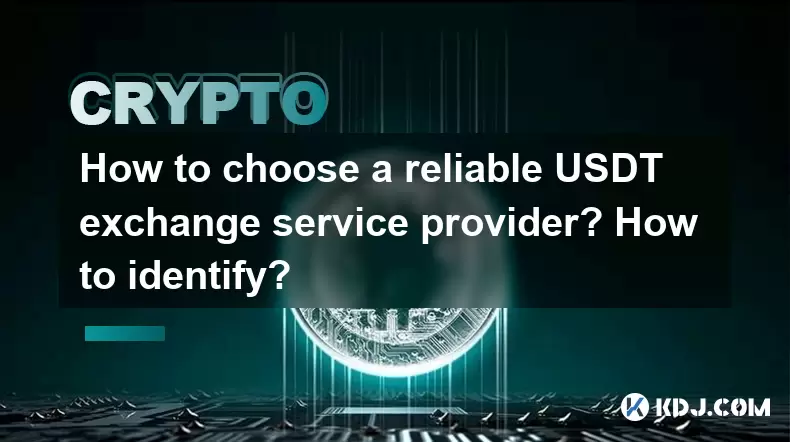
How to choose a reliable USDT exchange service provider? How to identify?
Jun 12,2025 at 03:15pm
Understanding the Role of USDT in Cryptocurrency TradingUSDT (Tether) is one of the most widely used stablecoins in the cryptocurrency market. It is d...
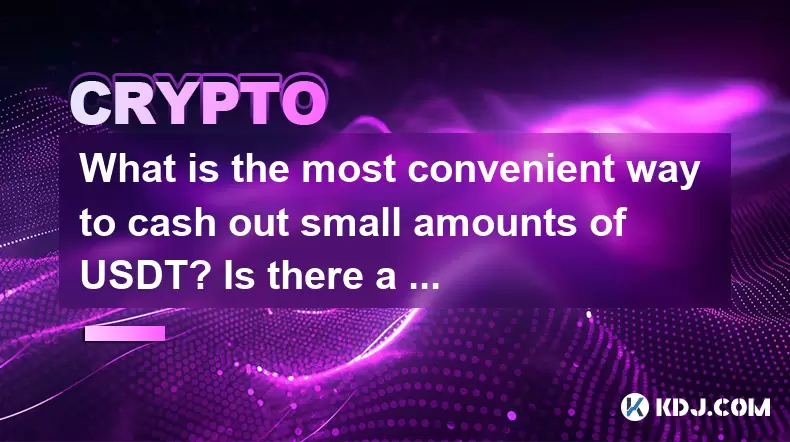
What is the most convenient way to cash out small amounts of USDT? Is there a shortcut?
Jun 11,2025 at 11:00pm
Understanding the Need to Cash Out Small USDT AmountsCashing out small amounts of USDT can be a challenge for many crypto users. Traditional methods o...
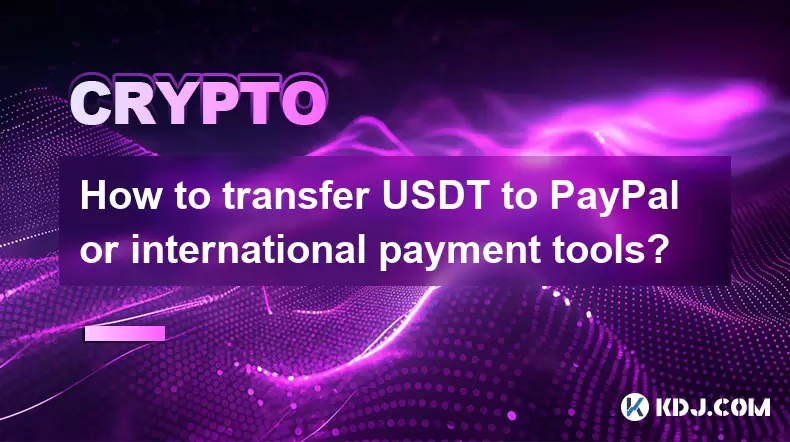
How to transfer USDT to PayPal or international payment tools?
Jun 15,2025 at 05:28am
Understanding the Basics of USDT and PayPal IntegrationUSDT (Tether) is a stablecoin pegged to the US dollar, offering blockchain-based value transfer...
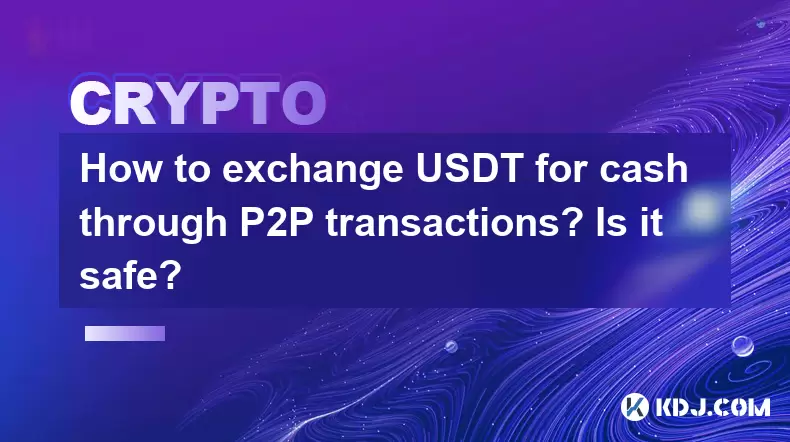
How to exchange USDT for cash through P2P transactions? Is it safe?
Jun 18,2025 at 07:56am
Understanding USDT and P2P TransactionsTether (USDT) is a stablecoin pegged to the value of the US dollar, making it a popular choice for users who wa...
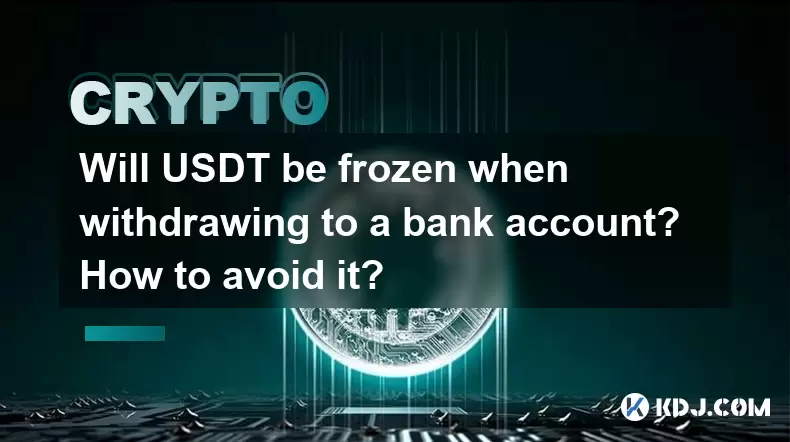
Will USDT be frozen when withdrawing to a bank account? How to avoid it?
Jun 15,2025 at 10:03am
Understanding USDT Withdrawals and Bank Account Freezing RisksWhen users decide to withdraw USDT (Tether) to a bank account, one of the most common co...
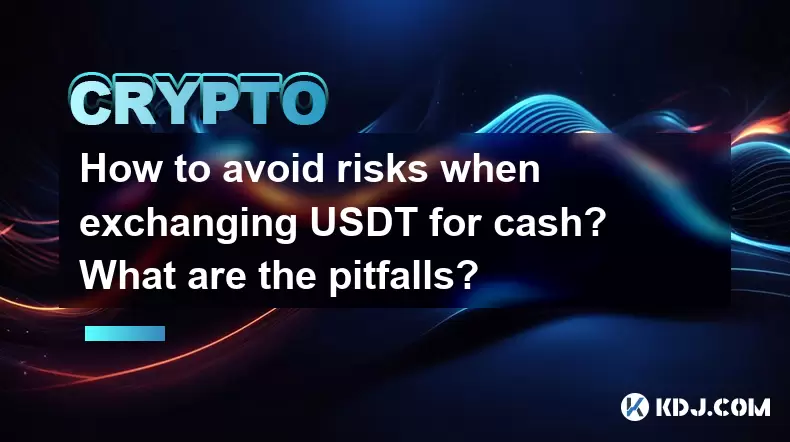
How to avoid risks when exchanging USDT for cash? What are the pitfalls?
Jun 11,2025 at 08:14pm
Understanding the Risks of Exchanging USDT for CashWhen exchanging USDT (Tether) for cash, users must be aware of the potential risks involved. As a s...

How to choose a reliable USDT exchange service provider? How to identify?
Jun 12,2025 at 03:15pm
Understanding the Role of USDT in Cryptocurrency TradingUSDT (Tether) is one of the most widely used stablecoins in the cryptocurrency market. It is d...

What is the most convenient way to cash out small amounts of USDT? Is there a shortcut?
Jun 11,2025 at 11:00pm
Understanding the Need to Cash Out Small USDT AmountsCashing out small amounts of USDT can be a challenge for many crypto users. Traditional methods o...

How to transfer USDT to PayPal or international payment tools?
Jun 15,2025 at 05:28am
Understanding the Basics of USDT and PayPal IntegrationUSDT (Tether) is a stablecoin pegged to the US dollar, offering blockchain-based value transfer...

How to exchange USDT for cash through P2P transactions? Is it safe?
Jun 18,2025 at 07:56am
Understanding USDT and P2P TransactionsTether (USDT) is a stablecoin pegged to the value of the US dollar, making it a popular choice for users who wa...

Will USDT be frozen when withdrawing to a bank account? How to avoid it?
Jun 15,2025 at 10:03am
Understanding USDT Withdrawals and Bank Account Freezing RisksWhen users decide to withdraw USDT (Tether) to a bank account, one of the most common co...

How to avoid risks when exchanging USDT for cash? What are the pitfalls?
Jun 11,2025 at 08:14pm
Understanding the Risks of Exchanging USDT for CashWhen exchanging USDT (Tether) for cash, users must be aware of the potential risks involved. As a s...
See all articles





















![Ultra Paracosm by IlIRuLaSIlI [3 coin] | Easy demon | Geometry dash Ultra Paracosm by IlIRuLaSIlI [3 coin] | Easy demon | Geometry dash](/uploads/2026/01/31/cryptocurrencies-news/videos/origin_697d592372464_image_500_375.webp)




















































